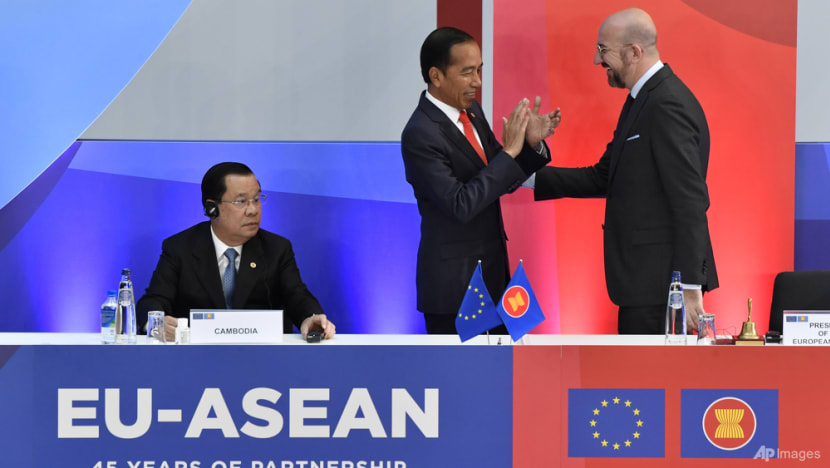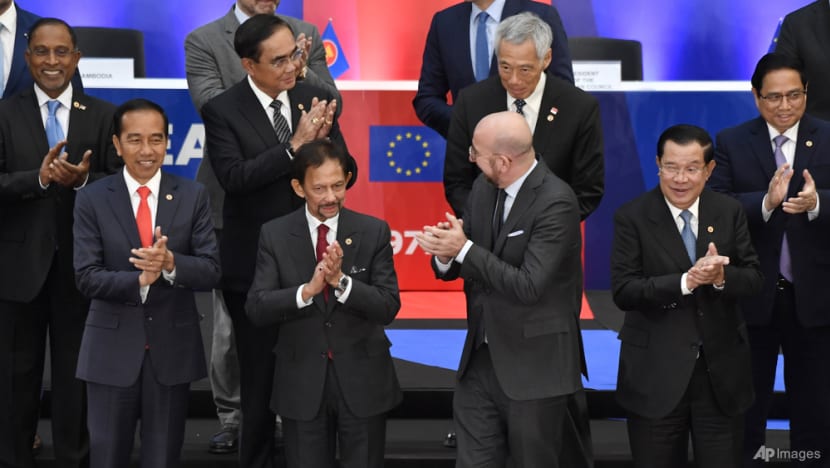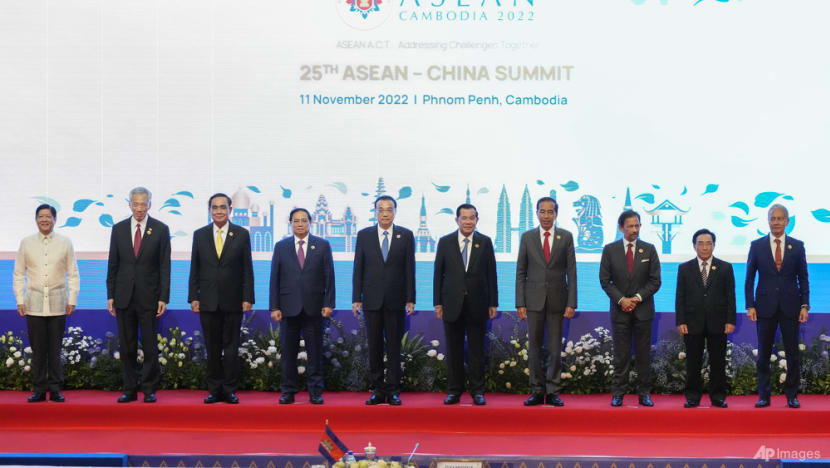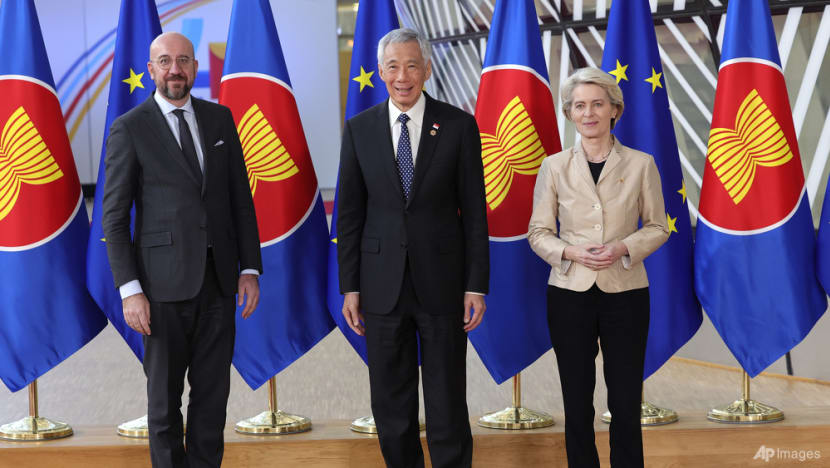Self-interests at play as EU, ASEAN navigate China, seek rules-based world order: Observers
The European Parliament, the region's “moral conscience”, would not agree to a free trade agreement with all of ASEAN with the ongoing crisis in Myanmar, said one observer.

SINGAPORE: European and Southeast Asian countries seek peace and stability in a multipolar world, and both regions have aligned interests in that aspect, observers said.
However, regional issues remain, such as the Ukraine war in Europe and the Myanmar crisis in Southeast Asia, and how each region responds to them would impact other facets of the relationship, such as trade agreements.
Leaders of 27 European Union (EU) countries and nine from the Association of Southeast Asian Nations (ASEAN) met on Wednesday (Dec 14) at a special summit in Brussels to commemorate 45 years of diplomatic relations between the two blocs.
During the meeting, they discussed areas of future cooperation, including trade, and the green and digital economies.
SELF INTERESTS
Dr David Camroux, honorary senior research fellow at the Centre for International Studies at Sciences Po, said the outcome of the summit was “an example of enlightened self interest”.
The joint statement of the leaders indicated that the European strategy on the Indo-Pacific is very much like the ASEAN outlook on the region, he told CNA’s Asia First on Thursday.
There is also a convergence of interests between both regional blocs when it comes to China.
“Neither the Southeast Asian countries nor the Europeans want to be in a situation which the Americans seem to want, for us to confront China,” said Dr Camroux, adding that neither bloc wants to isolate the East Asian superpower.

He noted that the portion of the joint statement on the South China Sea supports the ASEAN position of following the code of conduct outlined in the United Nations Convention of the Law of the Sea.
The EU’s Global Gateway initiative, Europe's competitive strategy to the Chinese Belt and Road Initiative, is also another example of self interest at play.
“This is in Southeast Asia’s interest to have a third possibility of financing, other than China and the United States. And Europe, promising this 10 billion (euros) at least, is offering that third alternative. So there is that convergence of interest,” said Dr Camroux.
He added that both blocs want to live in a multipolar world.
“What we need in that multipolar world is rules of the game (and) a rules-based order, and I think that was against something emphasised in the declaration coming out of the summit,” he said.

ON RUSSIA
“When it comes to Russia, I think obviously Europe would like to have the harshest possible words one could have on a communique. But as we saw at the G20, not all countries are on board,” said INSEAD economics professor Antonio Fatas.
The final communique from the G20 summit in the Indonesian island of Bali last month had said the majority of members strongly condemned the war in Ukraine, but noted there were other views.
Prof Fatas told CNA’s Asia Tonight on Wednesday, that while countries are okay with “loose statements of condemnation … not everyone is willing to go and totally impose sanctions the way the Europeans are”.
He said most countries just want peace and stability and to deepen economic relations, and that the type of actions the Europeans want to or have already taken, “are probably very different from what other countries want to take, in particular in Asia”.
Dr Camroux noted that while the summit’s joint statement did show a majority of ASEAN countries criticising the Russian actions, it was not a unanimous decision.
“But it wasn't really expected that the ASEAN countries would go further than that,” he said.
Vietnam, Laos and Thailand had abstained from a United Nations vote in October this year condemning Russia's attempted annexation of regions of Ukraine.
Dr Camroux said it is “symbolically important” for the EU to get ASEAN’s support as it faces the “existential threat” in Ukraine.
“The West is back. Vladimir Putin has done more for European integration and for the reconsolidation of the West than (anything) since the end of the Cold War. There's nothing like a common adversary to unite people,” he said.
He noted that the Ukraine war is the “first and bloodiest war in Europe since the end of the second World War” and is right “on Europe's doorstep”.
TRADE AGREEMENT
Meanwhile, “systemic” impediments remain as the EU and ASEAN seek to deepen bloc-to-bloc trade agreements.
Dr Camroux explained that the European Commission is the main body responsible for negotiating the region’s free trade agreements, such as the ones that exist with Singapore, Vietnam, South Korea and Japan.

“The problem is that the ASEAN Secretariat doesn't have the prerogative. The free trade agreements are the responsibilities of individual ASEAN member states,” he said.
As such, a more realistic strategy for the Europeans is negotiating individual free trade agreements with countries like the Philippines, Malaysia and Thailand, and then “consolidating these into some sort of total pact”, said Dr Camroux.
However, given the current crisis in Myanmar, a free trade agreement with all of ASEAN would not be ratified by the European Parliament, he said.
“The issue of the civil war in Myanmar is a very emotional issue in the European Parliament, which is kind of the moral conscience, so to speak, of Europe. So that would make it more difficult,” he said.
“So the Myanmar issue really has to be dealt with, for this relationship to go another step further.”
He noted that the topic of Myanmar was “a little bit shoved aside” at the Brussels summit, with the European countries saying they would continue to support ASEAN in the application of the Five-Point Consensus.
“This is problematic because it's very clear that the junta in Naypyidaw, is not willing to play by the rules of the game … and hasn't, even 18 months later, instituted the first of those points.”














